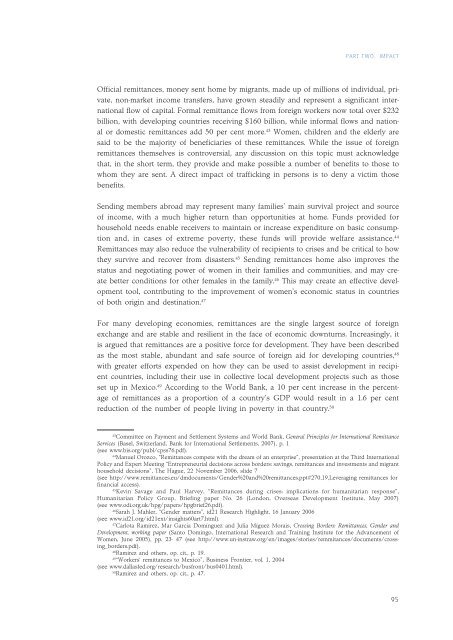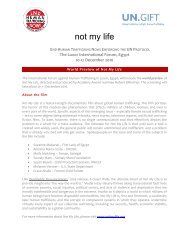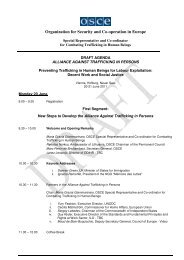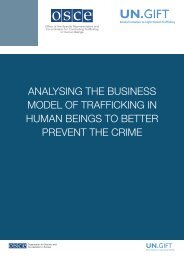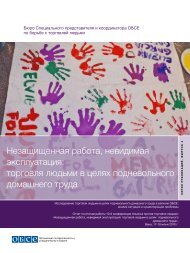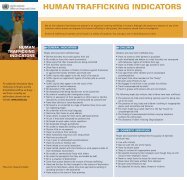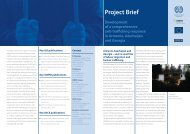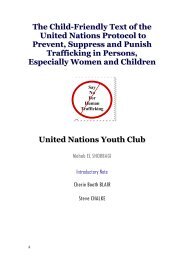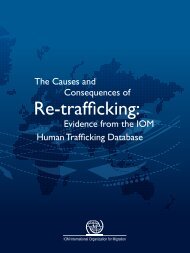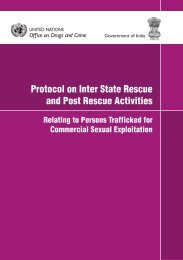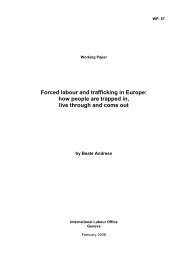An Introduction to Human Trafficking - United Nations Office on ...
An Introduction to Human Trafficking - United Nations Office on ...
An Introduction to Human Trafficking - United Nations Office on ...
You also want an ePaper? Increase the reach of your titles
YUMPU automatically turns print PDFs into web optimized ePapers that Google loves.
PART TWO.—IMPACT<br />
Official remittances, m<strong>on</strong>ey sent home by migrants, made up of milli<strong>on</strong>s of individual, private,<br />
n<strong>on</strong>-market income transfers, have grown steadily and represent a significant internati<strong>on</strong>al<br />
flow of capital. Formal remittance flows from foreign workers now <str<strong>on</strong>g>to</str<strong>on</strong>g>tal over $232<br />
billi<strong>on</strong>, with developing countries receiving $160 billi<strong>on</strong>, while informal flows and nati<strong>on</strong>al<br />
or domestic remittances add 50 per cent more. 43 Women, children and the elderly are<br />
said <str<strong>on</strong>g>to</str<strong>on</strong>g> be the majority of beneficiaries of these remittances. While the issue of foreign<br />
remittances themselves is c<strong>on</strong>troversial, any discussi<strong>on</strong> <strong>on</strong> this <str<strong>on</strong>g>to</str<strong>on</strong>g>pic must acknowledge<br />
that, in the short term, they provide and make possible a number of benefits <str<strong>on</strong>g>to</str<strong>on</strong>g> those <str<strong>on</strong>g>to</str<strong>on</strong>g><br />
whom they are sent. A direct impact of trafficking in pers<strong>on</strong>s is <str<strong>on</strong>g>to</str<strong>on</strong>g> deny a victim those<br />
benefits.<br />
Sending members abroad may represent many families’ main survival project and source<br />
of income, with a much higher return than opportunities at home. Funds provided for<br />
household needs enable receivers <str<strong>on</strong>g>to</str<strong>on</strong>g> maintain or increase expenditure <strong>on</strong> basic c<strong>on</strong>sumpti<strong>on</strong><br />
and, in cases of extreme poverty, these funds will provide welfare assistance. 44<br />
Remittances may also reduce the vulnerability of recipients <str<strong>on</strong>g>to</str<strong>on</strong>g> crises and be critical <str<strong>on</strong>g>to</str<strong>on</strong>g> how<br />
they survive and recover from disasters. 45 Sending remittances home also improves the<br />
status and negotiating power of women in their families and communities, and may create<br />
better c<strong>on</strong>diti<strong>on</strong>s for other females in the family. 46 This may create an effective development<br />
<str<strong>on</strong>g>to</str<strong>on</strong>g>ol, c<strong>on</strong>tributing <str<strong>on</strong>g>to</str<strong>on</strong>g> the improvement of women’s ec<strong>on</strong>omic status in countries<br />
of both origin and destinati<strong>on</strong>. 47<br />
For many developing ec<strong>on</strong>omies, remittances are the single largest source of foreign<br />
exchange and are stable and resilient in the face of ec<strong>on</strong>omic downturns. Increasingly, it<br />
is argued that remittances are a positive force for development. They have been described<br />
as the most stable, abundant and safe source of foreign aid for developing countries, 48<br />
with greater efforts expended <strong>on</strong> how they can be used <str<strong>on</strong>g>to</str<strong>on</strong>g> assist development in recipient<br />
countries, including their use in collective local development projects such as those<br />
set up in Mexico. 49 According <str<strong>on</strong>g>to</str<strong>on</strong>g> the World Bank, a 10 per cent increase in the percentage<br />
of remittances as a proporti<strong>on</strong> of a country’s GDP would result in a 1.6 per cent<br />
reducti<strong>on</strong> of the number of people living in poverty in that country. 50<br />
43<br />
Committee <strong>on</strong> Payment and Settlement Systems and World Bank, General Principles for Internati<strong>on</strong>al Remittance<br />
Services (Basel, Switzerland, Bank for Internati<strong>on</strong>al Settlements, 2007), p. 1<br />
(see www.bis.org/publ/cpss76.pdf).<br />
44<br />
Manuel Orozco, “Remittances compete with the dream of an enterprise”, presentati<strong>on</strong> at the Third Internati<strong>on</strong>al<br />
Policy and Expert Meeting “Entrepreneurial decisi<strong>on</strong>s across borders: savings, remittances and investments and migrant<br />
household decisi<strong>on</strong>s”, The Hague, 22 November 2006, slide 7<br />
(see http://www.remittances.eu/dmdocuments/Gender%20and%20remittances.ppt#270,19,Leveraging remittances for<br />
financial access).<br />
45<br />
Kevin Savage and Paul Harvey, “Remittances during crises: implicati<strong>on</strong>s for humanitarian resp<strong>on</strong>se”,<br />
<str<strong>on</strong>g>Human</str<strong>on</strong>g>itarian Policy Group, Briefing paper No. 26 (L<strong>on</strong>d<strong>on</strong>, Overseas Development Institute, May 2007)<br />
(see www.odi.org.uk/hpg/papers/hpgbrief26.pdf).<br />
46<br />
Sarah J. Mahler, “Gender matters”, id21 Research Highlight, 16 January 2006<br />
(see www.id21.org/id21ext/insights60art7.html).<br />
47<br />
Carlota Ramírez, Mar García Domínguez and Julia Míguez Morais, Crossing Borders: Remittances, Gender and<br />
Development, working paper (San<str<strong>on</strong>g>to</str<strong>on</strong>g> Domingo, Internati<strong>on</strong>al Research and Training Institute for the Advancement of<br />
Women, June 2005), pp. 23- 47 (see http://www.un-instraw.org/en/images/s<str<strong>on</strong>g>to</str<strong>on</strong>g>ries/remmitances/documents/crossing_borders.pdf).<br />
48<br />
Ramírez and others, op. cit., p. 19.<br />
49<br />
“Workers' remittances <str<strong>on</strong>g>to</str<strong>on</strong>g> Mexico”, Business Fr<strong>on</strong>tier, vol. 1, 2004<br />
(see www.dallasfed.org/research/busfr<strong>on</strong>t/bus0401.html).<br />
50<br />
Ramírez and others, op. cit., p. 47.<br />
95


